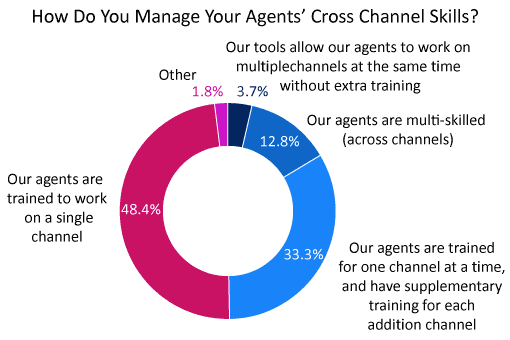Our new research has found that the percentage of contact centres that are multiskilling advisors has decreased in 2019, and this is not a new trend.
When we started producing annual in-depth reports into the current state of the contact centre industry in 2015, 90.5% of contact centres were multiskilling advisors.
However, as the years have gone by, this percentage has fallen to 83.9%.
In fact, the percentage has been steadily decreasing, falling in four of the past five years, despite the engagement and resource planning benefits that multiskilling can bring.
So, why are some contact centres choosing not to multiskill advisors any more?
Increasing Complexity Caused by Self-Service
We can speculate that more contact centres are deciding to make advisors specialists in one area, with organizations facing tougher queries, as self-service handles more of those simple, transactional contacts.
With more organizations trying to create frictionless customer journeys, installing self-service and other forms of automation, customers don’t necessarily need to contact us in the call centre.
Great news, right? Well yes, but we need to acknowledge the impact that this has on the advisor role.
Advisors will be handling more complex contacts one after another, with no transactional contacts to use as a “breather”.
With more technology in place, advisors will also be speaking to more frustrated customers who have tried the self-service option first and bounced into the contact centre.
When contact centres sense this happening, it would seem appropriate to revert to making advisors specialists in one area, while increasing soft skills to better deal with challenging customers.
The Growth in Call Routing Technology Supports This Argument
While we can only speculate as to why fewer contact centres are multiskilling advisors, the increasing number of organizations using routing technology backs up the idea that contact centres want to create advisors that are specialists in certain areas.
In fact, according to our new survey report, the percentage of contact centres using call routing through an ACD system has been increasing in three of the past four years, with 89.7% now doing so.
There are also new technologies, such as predictive routing that use artificial intelligence (AI) to match the customer to the most appropriate advisor.
With these capabilities there to support specialist advisors, it’s easy to see why some brands are doing this. The challenge, however, becomes how can they motivate advisors in other ways, if their job becomes more repetitive through the demise of multiskilling.
Multiskilling May Be Hurting Productivity
While up until now, this article has focused on the premise that increasing complexity has led to companies turning away from multiskilling advisors, there could be other reasons.
One reason that does gain momentum, as we look further into it, is that when advisors are constantly asked to switch from one query type to another, their productivity may drop.
Of course, this will depend on how we define and track productivity in the contact centre, but there has been research that criticizes the impact that multiskilling has on our output.
For example, take the three following pieces of research:
- Multitaskers experience a 40% drop in productivity across the board (American Psychological Association)
- Multitaskers take 50% longer to accomplish a single task (Brain Rules – a book by John Medina)
- Multitaskers make up to 50% more errors (Brain Rules – a book by John Medina)
When we put multitasking in the light of constantly switching contexts, it only makes sense that productivity will drop.
Also, with a large number of psychological studies supporting this finding, there is a clear argument for contact centres to think twice about multiskilling advisors.
What Else Is the Research Suggesting?
While some contact centres appear to be turning away from multiskilling, some of those that remain dedicated to the initiative are seemingly becoming smarter in the ways in which they multiskill across channels – according to our research.
Until now, we have only discussed multiskilling in terms of different knowledge areas, but we can also train advisors to handle contacts across different platforms.
While this still may impact productivity, in the sense of moving from one format to another, the context of what is actually being said in the conversations may stay the same.
So, this is one way to have specialists but to multiskill them and take away some of that repetitiveness which is so often linked to the advisor role. It also can help with resource planning, if you want move advisors across channels to better meet demand.
This form of multiskilling isn’t yet as common as multiskilling across different knowledge areas but, as the graphic below suggests, some contact centres are now employing tools to help do this.

In fact, 3.7% of contact centres are now using tools to aid the growth of multiskilled advisors, while fewer than half (48.4%) offer no sort of cross-channel training at all.
This is interesting, as it suggests that the decline in multiskilling may only be temporary, as contact centres experiment with how they can gain more value from the initiative within today’s climate.
In Summary
Multiskilling is an initiative that is being used by fewer and fewer contact centres and we can speculate that there may be a number of reasons for this.
Maybe more contact centres are reacting to the increasing complexity of the advisor role, maybe the increasing popularity of specialized call routing has a part to play, or maybe the impact of multiskilling on productivity is being put under the spotlight.
With that being said, there are still many great benefits to multiskilling, and contact centres are starting to invest in technologies that improve cross-channel multiskilling.
So, it doesn’t seem like multiskilling is going anywhere soon, but we will just have to wait until our 2020 results to see if this surprising contact centre trend continues!
For a closer look at our 2019 results, which cover a number of different contact centre topics, read our full report: What Contact Centres Are Doing Right Now (2019 Edition)
Author: Charlie Mitchell
Reviewed by: Robyn Coppell
Published On: 11th Dec 2019 - Last modified: 21st Jan 2026
Read more about - Call Centre Management, Charlie Mitchell, Employee Engagement, Empowering Agents, Management Strategies, Multi-Skilling, Research, Team Management

















